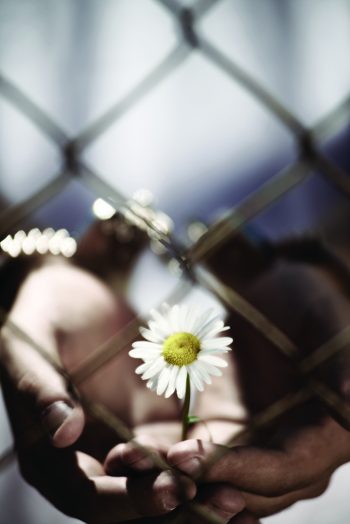The number of women in prison has increased dramatically in the last several decades, yet there is little research into women’s experiences in prison and how it affects their families.
Derek Kreager, professor of sociology and criminology at Penn State, and a multi-institutional team of researchers will explore the prison and re-entry experiences of women incarcerated in two Pennsylvania prisons in a three-year project funded by the National Institute of Justice.
After several years of focusing on incarcerated men, for the first time Kreager and his research team will explore the social landscape in women’s prisons. “There hasn’t been a lot of research into women’s experiences of being incarcerated, released or being reincarcerated,” Kreager explained. “We also don’t know about the effects incarceration has on their families, including their children, as many of the women are mothers.”
The impact of female incarceration on child well-being is of particular concern, as incarcerated women are much more likely than their male counterparts to be primary caregivers of minor children at the time of their imprisonment. “Previous research indicates that if a mother becomes incarcerated, it increases the child’s risk of entry into the foster care system, which can further disrupt child well-being,” said Kreager, who is also a co-funded faculty member of the Child, Youth and Family Consortium, which is a part of Penn State’s Social Science Research Institute.
In the first phase of the project, the research team will work with prison staff to identify one unit in each of the prisons to conduct approximately 100 to 200 network and health interviews. The researchers will analyze the data to reveal the unit’s friendship network, hierarchy and romantic ties, as well as to find associations between inmate networks and prison health outcomes.
In phase two, parole-eligible respondents will be interviewed about their future expectations and preparations for community re-entry. “This will give us a unique glimpse into the reentry process women undergo after being incarcerated and how it affects family reintegration, employment, post-release program participation, and relapse,” Kreager said.
Additionally, child and caregiver interviews will be conducted for inmate respondents who are mothers. According to Kreager, “These interviews will capture the well-being, fears, aspirations and preparation of inmates' families and surrogate parents prior to prison release.”
During the final phase of the project, the researchers will interview the previously imprisoned women to understand how they, their children and caregivers have adjusted to life after prison and if they were able to achieve their previously stated goals. The researchers will also compare the factors underlying successful re-entry into society versus those who become reincarcerated.
The process will be repeated for the second prison site in the second year of the project. “One of the prisons will be low security with inmates serving shorter sentences, while the other will be high security with long term inmates, so it will be interesting to see the differences in social structure and outcomes,” said Kreager.
He also expects to see several differences from his previous work with incarcerated men. “We know that incarcerated women are dealing with more victimization experiences and mental health and substance abuse issues. Often they have children they are the caregivers of, so we will learn more about child custody issues, the foster system and child protective services,” Kreager explained. “Additionally, from what we’ve observed there is often a clear hierarchy in men’s prisons, while in women’s prisons there are more groups. Women tend to form more pseudo-families in prison, but with so many distinct groups there is also an increased chance for more tensions.”
The researchers hope their work will affect policies for prisoner reentry and provide additional information that began with previous studies. “We’ll be getting this information in the women’s own words, which has been missing in previous research, so we’ll have a better understanding of what they are going through and what they are feeling,” said Kreager.
Other researchers on the project include Gary Zajac, director of Penn State’s Justice Center for Research, Dana Haynie, professor and director of the Criminal Justice Research Center at Ohio State, Sara Wakefield, associate professor of criminal justice at Rutgers University, and Michaela Soyer, assistant professor of sociology at Hunter College.
The project also involves the following Penn State criminology graduate students and research associates: Corey Whichard, Kim Davidson, Ted Greenfelder, Brianna Jackson, Elaine Arsenault and Gerardo Cuevas.
The researchers worked with the Pennsylvania Department of Corrections’ Office of Planning, Research, Statistics and Grants to obtain approval and support for the project, while the Justice Center for Research in the College of the Liberal Arts provided seed funding.
Article posted from Penn State News
